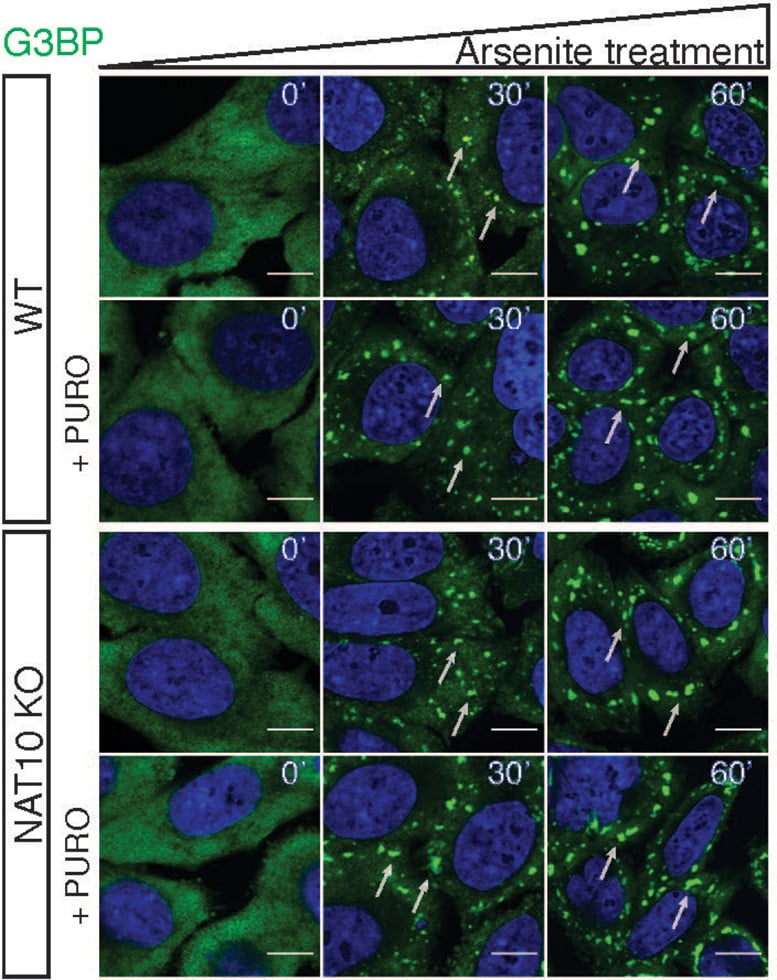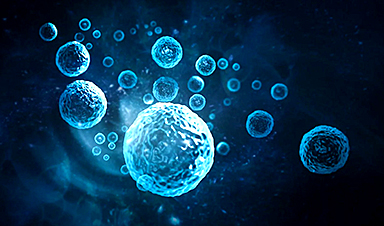Stress granules play a crucial role in the stress response, arising from the aggregation of non-translating mRNAs and proteins. Although significant knowledge exists about stress granules, the mechanisms behind their mRNA localization remain partially understood. Alterations to mRNA can change the characteristics of the nucleobases, influencing key processes like translation, splicing, and the positioning of specific transcripts.
The researchers show that the RNA modification N4-acetylcytidine (ac4C) on mRNA associates with transcripts enriched in stress granules and that stress granule localized transcripts with ac4C are specifically translationally regulated.
They also show that ac4C on mRNA can mediate the localization of proteins to stress granules. Their results suggest that acetylation of mRNA regulates the localization of both stress-sensitive transcripts and RNA-binding proteins to stress granules and adds to our understanding of the molecular mechanisms responsible for stress granule formation.
Stress Granule Formation and RNA Modifications
Stress granules are membrane-less assemblies of mRNA-protein complexes that arise from mRNAs stuck in translation initiation. RNA-protein complexes are important for their formation and the mechanisms promoting stress granule formation involve both conventional RNA-protein interactions and interactions that encompass intrinsically disordered regions of proteins.
Figure shows stress granule formation after oxidative stress in wild-type cells and cells depleted for the ac4C acetyltransferase enzyme NAT10. Credit: Pavel Kudrin
Stress granules have been extensively studied, and it is well-established that they form when translation initiation is limited a variety of roles for stress granules within the cell have been proposed. While stress granule assembly and disassembly can be regulated by various post-translational modifications the impact of RNA modifications on their formation, dispersal, and function remains largely unclear.
Impact of ac4C on Stress Granules and Cellular Stress Response
The RNA modification N4-acetylcytidine (ac4C) has recently been shown to be deposited on mRNA and regulate translation efficiency. ac4C is conserved through all kingdoms of life and is induced upon several different stresses. ac4C is less abundant than other RNA modifications on mRNA and due to difficulties in precise and quantitative mapping its function and occurrence on mRNA have remained controversial.
The researchers show in their publication that ac4C is enriched in stress granules and that acetylated transcripts are predominantly localized to stress granules in response to oxidative stress, proposing a model where acetylation of RNA can affect mRNA localization to stress granules, in part by affecting the translational release of mRNA from the ribosome, providing new insight into both the function and consequences of mRNA acetylation and mechanism of RNA localization to stress granules.
The findings will promote the understanding of how the cells react to stress and which role RNA modifications play in the process. Both stress and RNA acetylation have implications in disease and their findings could help shed light on relevant molecular pathways that could be targeted in disease.
Reference: "N4-acetylcytidine (ac4C) promotes mRNA localization to stress granules" by Pavel Kudrin, Ankita Singh, David Meierhofer, Anna Kuśnierczyk and Ulf Andersson Vang Ørom, 27 February 2024, EMBO Reports.
DOI: 10.1038/s44319-024-00098-6
The project was led by Ulf A.V. Ørom's lab at Aarhus University in Denmark, and the study involved collaboration with researchers from the University of Tartu, Norwegian Technical University, and the Max Planck Institute for Molecular Genetics in Berlin.
News
New book from NanoappsMedical Inc – Molecular Manufacturing: The Future of Nanomedicine
This book explores the revolutionary potential of atomically precise manufacturing technologies to transform global healthcare, as well as practically every other sector across society. This forward-thinking volume examines how envisaged Factory@Home systems might enable the cost-effective [...]
A Virus Designed in the Lab Could Help Defeat Antibiotic Resistance
Scientists can now design bacteria-killing viruses from DNA, opening a faster path to fighting superbugs. Bacteriophages have been used as treatments for bacterial infections for more than a century. Interest in these viruses is rising [...]
Sleep Deprivation Triggers a Strange Brain Cleanup
When you don’t sleep enough, your brain may clean itself at the exact moment you need it to think. Most people recognize the sensation. After a night of inadequate sleep, staying focused becomes harder [...]
Lab-grown corticospinal neurons offer new models for ALS and spinal injuries
Researchers have developed a way to grow a highly specialized subset of brain nerve cells that are involved in motor neuron disease and damaged in spinal injuries. Their study, published today in eLife as the final [...]
Urgent warning over deadly ‘brain swelling’ virus amid fears it could spread globally
Airports across Asia have been put on high alert after India confirmed two cases of the deadly Nipah virus in the state of West Bengal over the past month. Thailand, Nepal and Vietnam are among the [...]
This Vaccine Stops Bird Flu Before It Reaches the Lungs
A new nasal spray vaccine could stop bird flu at the door — blocking infection, reducing spread, and helping head off the next pandemic. Since first appearing in the United States in 2014, H5N1 [...]
These two viruses may become the next public health threats, scientists say
Two emerging pathogens with animal origins—influenza D virus and canine coronavirus—have so far been quietly flying under the radar, but researchers warn conditions are ripe for the viruses to spread more widely among humans. [...]
COVID-19 viral fragments shown to target and kill specific immune cells
COVID-19 viral fragments shown to target and kill specific immune cells in UCLA-led study Clues about extreme cases and omicron’s effects come from a cross-disciplinary international research team New research shows that after the [...]
Smaller Than a Grain of Salt: Engineers Create the World’s Tiniest Wireless Brain Implant
A salt-grain-sized neural implant can record and transmit brain activity wirelessly for extended periods. Researchers at Cornell University, working with collaborators, have created an extremely small neural implant that can sit on a grain of [...]
Scientists Develop a New Way To See Inside the Human Body Using 3D Color Imaging
A newly developed imaging method blends ultrasound and photoacoustics to capture both tissue structure and blood-vessel function in 3D. By blending two powerful imaging methods, researchers from Caltech and USC have developed a new way to [...]
Brain waves could help paralyzed patients move again
People with spinal cord injuries often lose the ability to move their arms or legs. In many cases, the nerves in the limbs remain healthy, and the brain continues to function normally. The loss of [...]
Scientists Discover a New “Cleanup Hub” Inside the Human Brain
A newly identified lymphatic drainage pathway along the middle meningeal artery reveals how the human brain clears waste. How does the brain clear away waste? This task is handled by the brain’s lymphatic drainage [...]
New Drug Slashes Dangerous Blood Fats by Nearly 40% in First Human Trial
Scientists have found a way to fine-tune a central fat-control pathway in the liver, reducing harmful blood triglycerides while preserving beneficial cholesterol functions. When we eat, the body turns surplus calories into molecules called [...]
A Simple Brain Scan May Help Restore Movement After Paralysis
A brain cap and smart algorithms may one day help paralyzed patients turn thought into movement—no surgery required. People with spinal cord injuries often experience partial or complete loss of movement in their arms [...]
Plant Discovery Could Transform How Medicines Are Made
Scientists have uncovered an unexpected way plants make powerful chemicals, revealing hidden biological connections that could transform how medicines are discovered and produced. Plants produce protective chemicals called alkaloids as part of their natural [...]
Scientists Develop IV Therapy That Repairs the Brain After Stroke
New nanomaterial passes the blood-brain barrier to reduce damaging inflammation after the most common form of stroke. When someone experiences a stroke, doctors must quickly restore blood flow to the brain to prevent death. [...]





















